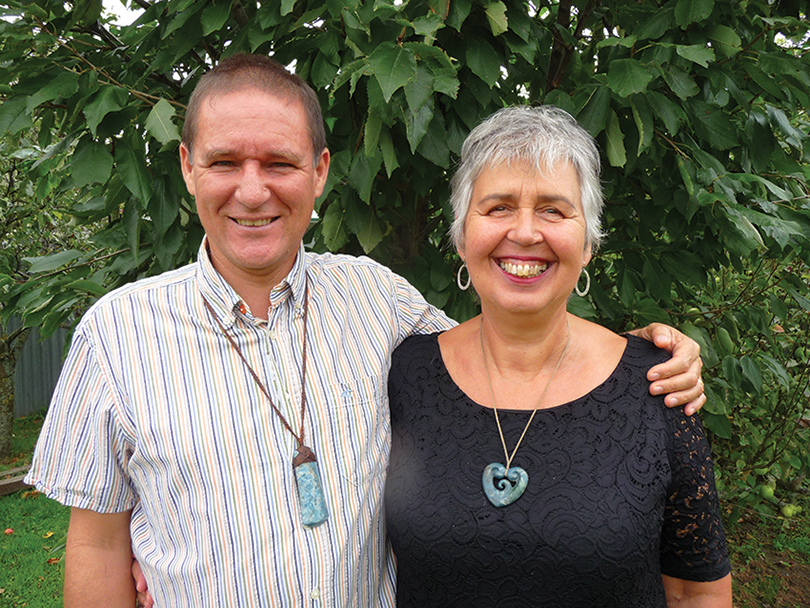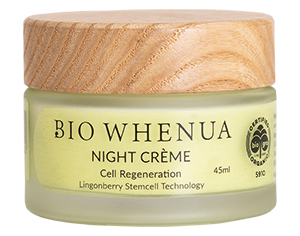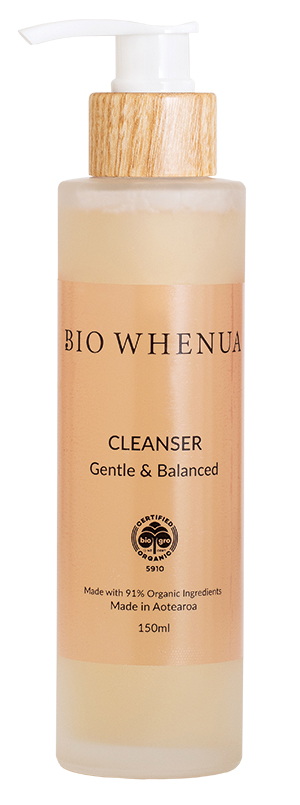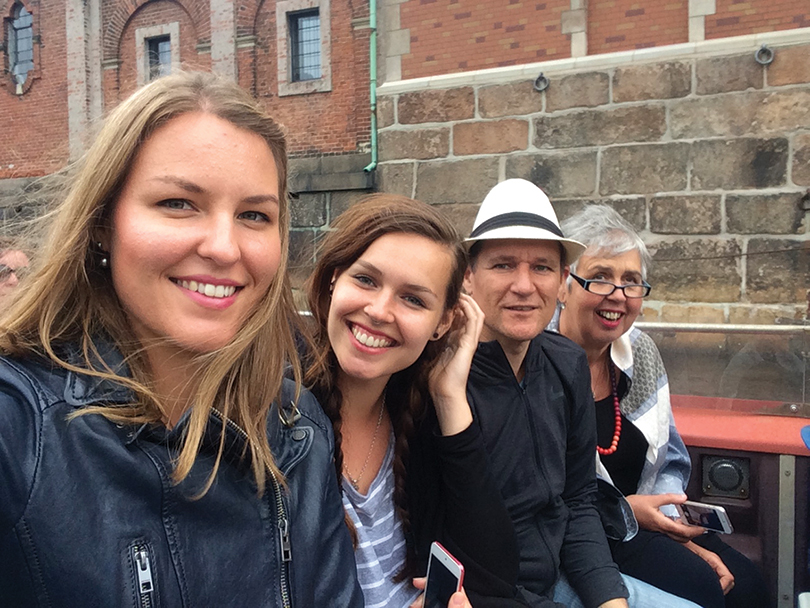Essential Healing
Dec 22, 2019

When Jytte Glintborg and Tremane Barr bought Zurma Botanical Oil Studio in 2012, they always planned to move it towards organic, high-quality natural products. Seven years on their vision is coming to fruition, as they prepare to launch their range of handcrafted organic skincare. Kaituhi Jocelyn Henderson reports on the journey behind their business.

Above: Bio Whenua creators Tremane Barr and Jytte Glintborg.
For Tremane (Ngāi Tahu) and Jytte, the move to buy Zurma was a good fit with their values. Jytte had been buying Zurma oils for more than 20 years in her work as a massage therapist, and Tremane has long been interested in organic gardening.
But just two weeks after purchasing Zurma, Tremane was diagnosed with a rare form of pancreatic cancer. He was told that his cancer was untreatable, and terminal.
 Needless to say, the business took a back seat while the couple focused on Tremane’s health. “If we’d known about the cancer beforehand,” Tremane says, “we never would have said yes to it.”
Needless to say, the business took a back seat while the couple focused on Tremane’s health. “If we’d known about the cancer beforehand,” Tremane says, “we never would have said yes to it.”
While the doctors suggested some experimental treatments, Tremane refused them, due to the low likelihood of success and the horrific side effects. “I thought, ‘No thank you, I’ll take my chances.’”
Instead, he used a range of natural remedies to try to fight the cancer and help his body recover. Taking advice from various experts, Tremane incorporated herbal tinctures, supplements, homeopathy, meditation, and psychotherapy. He also changed to an extremely clean diet, living organically, and using natural therapies.
“It’s quite lucky that we’re both on the same page, that we both thought that was the path we wanted to take,” Jytte says.
 Tremane’s health stabilised, but it wasn’t until a soil test during the earthquake rebuild showed that the it was toxic that his recovery really began. He had always grown most of the family’s vegetables in their Christchurch garden. After the shock of learning their soil was contaminated with heavy metals, they stopped eating from the garden until they got it replaced.
Tremane’s health stabilised, but it wasn’t until a soil test during the earthquake rebuild showed that the it was toxic that his recovery really began. He had always grown most of the family’s vegetables in their Christchurch garden. After the shock of learning their soil was contaminated with heavy metals, they stopped eating from the garden until they got it replaced.
It was also around this time that Tremane discovered the benefits of essential oils for himself, and added them to his toolkit of remedies.
“It took me a few years to figure out that essential oils were actually helpful in dealing with cancer. Once I found that out, I started thinking, ‘Where can we get the best possible oils, not just for me, but to sell in the business?’”
The business had been ticking over in the background while Tremane recovered. During that time, the couple were getting to know the products, customers, and business sector as a whole. The time gave them the opportunity to find “the quality we knew existed, but didn’t quite know where to find.”
Generally, about 75 per cent of essential oils are adulterated in some way. At Zurma they make sure they get the 25 per cent that are natural and high-quality.
Their relationship with their New Zealand growers is important, and they’re always looking to support new organic ventures. An iwi up north is planning to develop native plant extract material, and when that becomes available the couple are keen to use it in future products.
“It’s a funny sort of business, essential oils,” Tremane says. “Just because it’s organic doesn’t necessarily mean it’s better.
“We’re expanding our organic range all the time, but it’s a matter of making sure we get the best quality for it.”
The couple had always planned to shift the business towards organic produce.
“We’d always been naturally inclined towards organics, plus we had the cancer scare at the same time, and we just took the business further and further in the logical direction for us in terms of our beliefs and lifestyle,” Jytte says.
 “We Walk the Talk. That is the key foundation for us.”
“We Walk the Talk. That is the key foundation for us.”
The couple’s shared interest in natural health and natural ways of living is what led to their meeting, at a hippy festival in Te Waipounamu in 1988.
Zurma is a whānau-based business, with Kiri, one of the couple’s two daughters involved with the business, and their son-in-law also helps out. “He’s an accountant, so he chips in and keeps an eye on us,” Jytte says.
Many Zurma creams start off in the kitchen, where Jytte and her daughter play around with recipes. They start off with an ingredient or an idea for a product, and manufacturers in Dunedin and Christchurch help develop the recipes for large-scale production.
Zurma organic products are certified with New Zealand-based company BioGro. Gaining organic certification is a time-consuming and comprehensive process – every step has to be certified organic. “Everything can be tracked and traced from the fields right through to the end product,” Jytte says.

Above: Tremane and Jytte with daughters Quoyah and Kiri.
The road to BioGro certification was long. A lot of products didn’t pass the test, so they had to keep finding new sources to get the right process.
“They are strict,” Jytte says. “But it’s good, because when you have it you know you have an absolutely fantastic product.”
Some of the products that came with the business, like mānuka honey cream, were popular; but Tremane and Jytte didn’t like the preservatives, so they embarked on making organic versions. Now they have variations on the original product that use ingredients like hoheria, kānuka, and kawakawa.
Their relationship with their New Zealand growers is important, and they’re always looking to support new organic ventures. An iwi up north is planning to develop native plant extract material, and when that becomes available, the couple are keen to use it in future products.
“We live in this land, we live in this country – to use what’s around us is important,” Jytte says. “It has the energy, the resonance.”
The couple ensure all their imported ingredients are also sourced sustainably. The global demand for essential oils means there is a lot of pressure on some trees used to extract the oils.
 Tremane mentions rosewood oil, which comes from a Brazilian rainforest tree. Harvests are not managed sustainably. Therefore, Jytte and Tremane found a rosewood replacement blend, a mixture of oils from sustainably managed sources. Other popular oils like sandalwood and frankincense have also been over-exploited and are under pressure. In the past they have sent products back, but over time have narrowed down suppliers to ensure they are getting quality, sustainably-produced oils. Jytte and Tremane are also moving towards sustainable packaging, and try to use as little plastic as possible. The new organic skincare range they’re about to launch comes in beautiful glass and wood vessels, and they are aiming to implement a system where people can refill their empty containers in shops.
Tremane mentions rosewood oil, which comes from a Brazilian rainforest tree. Harvests are not managed sustainably. Therefore, Jytte and Tremane found a rosewood replacement blend, a mixture of oils from sustainably managed sources. Other popular oils like sandalwood and frankincense have also been over-exploited and are under pressure. In the past they have sent products back, but over time have narrowed down suppliers to ensure they are getting quality, sustainably-produced oils. Jytte and Tremane are also moving towards sustainable packaging, and try to use as little plastic as possible. The new organic skincare range they’re about to launch comes in beautiful glass and wood vessels, and they are aiming to implement a system where people can refill their empty containers in shops.
“It’s the future,” Jytte says simply. People use essential oils for many reasons, from relaxation to treating serious health issues. “We can usually see when someone has a very serious illness because of the particular combination of oils they use. But a lot of people want it for relaxation from stress, which is such a big part of today’s life,” Jytte says.
“People need specific things for their conditions, and they need to talk to their doctors as well, particularly if they’re taking medicine,” Tremane says.
Essential oils are potent and it’s important to use them safely, as incorrect use can have adverse effects. The couple are concerned about misleading information from large companies.
“We’re very clear, particularly through our social media, about how to safely use products,” Tremane says.
“We have these big overseas companies that push these things to make their bottom line, and push people to use these oils dangerously. That’s an unethical business practice, in my opinion, and it’s unsafe as well.”
At Zurma it’s the opposite: they are focused on safety. Jytte and Tremane have done courses on the safe use of oils, and share information and research on safety and best practice from the Tisserand Institute. The couple are compiling a safety pamphlet to help people use the oils correctly. “You don’t take them internally, and you don’t put them straight on your skin,” Tremane says.
Jytte says age and health are also factors in using essential oils; for example, children and the elderly shouldn’t use the same dose as people in middle age. She also says people need to think about their pets when they’re diffusing oils in the house. “Think about how sensitive a dog is to smell.”
As Jytte says, just because they’re natural doesn’t mean they’re not potent.
“When you think natural remedies have been instrumental in Tremane’s healing from a terminal pancreatic cancer, it’s pretty powerful. It’s more than just a nice smell.”
Above all, Jytte and Tremane want to empower others to get the same benefits that they have from the oils. “That’s one of the key things we want with the business – to empower people. To feel comfortable making your own decisions.
“Trust your body; trust your instincts and what’s good for you. It worked for Tremane.”
Further information on how to recover from cancer:
https://radicalremission.com